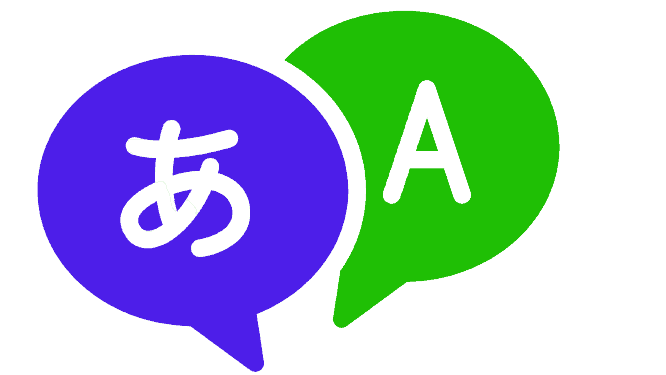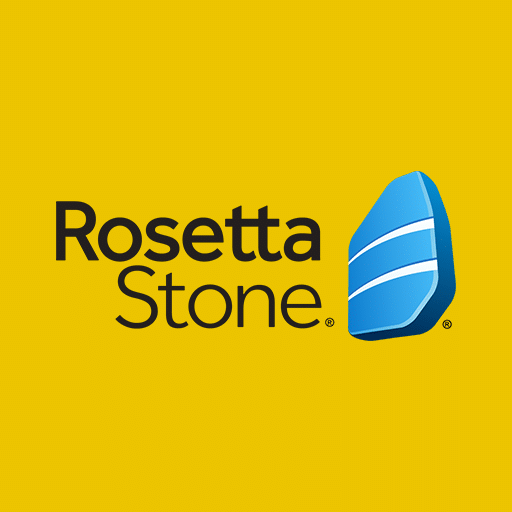Interested in starting a language study journey? It’s time to choose the ideal partner for your language goals. But how can you choose between Mondly and Rosetta Stone when there are so many options? We’ve got you covered. Join us as we compare two well-known language study applications, guiding you to a decision that will get you closer to fluency. We’ll look into the elements that really make them stand out, from intuitive user interfaces to immersive experiences. With Mondly vs. Rosetta Stone comparison, be ready to open to new worlds, increase your cultural awareness, and appreciate the power of language.
Rosetta Stone vs Mondly- Quick Comparison
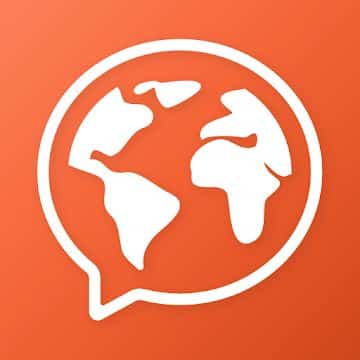
- Number of Languages: 41
- Free Trial (or free version): Yes
- Speech Recognition: Yes
- Avg. Lesson Length: 20 Minutes
- Pricing: $9.99
- Money Back Guarantee: 30 days
- Grammar Instruction: Average
- Live classes: No
- Progress Tracking: Yes
- Tests/Quizzes: Yes
Mondly Overview
The well-known language-learning application- Mondly was created to make it simple for users to learn several languages. Mondly provides an immersive learning experience with a user-friendly design and several language choices. Its cutting-edge features let users practice their language abilities in authentic environments, such as interactive lessons, voice recognition, and conversation simulations.
Additionally, Mondly offers individualized feedback and progress monitoring to keep students inspired and involved. It provides a complete platform to discover and appreciate new languages, regardless of your level of proficiency. Mondly wants to make language learning enjoyable and approachable for everyone.
My Mondly Experience
When I first entered into Mondly’s desktop version, I was met with an easy-to-use UI that displayed numerous cards promoting the chatbot function, vocabulary, and daily courses. I decided to make Spanish my goal language since I’m interested in studying it. The emphasis on teaching real-world events in Mondly really caught my attention. It covers a broad variety of subjects, such as family interactions, going places, using public transit, and even engaging with medical professionals.
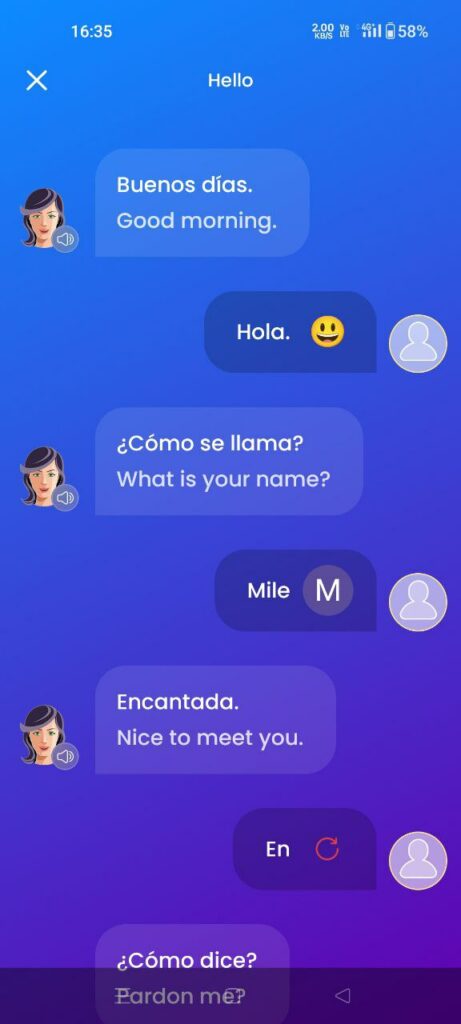
Each card comprises a series of eight lessons, which I found after clicking on any card to enter the lessons menu. Learning may be arranged and methodical thanks to this framework. I selected the statistics tab to keep track of my progress, which gave me useful information like my points and the time I’ve spent studying.
The leaderboard area was one aspect that brought some wholesome competition and incentive. It gave me a feeling of success and motivated me to continue improving by letting me know where I stood in relation to other students.
I chose the first lesson in the public travel course. Mondly walked me through the most important transportation-related vocabulary, including “ticket,” “train,” and “taxi.” Matching these words to the appropriate visuals was a necessary part of engaging with the information, furthering the educational experience. I also got the chance to hear how these terms were spoken in Spanish, which helped me better understand how the language was spoken.
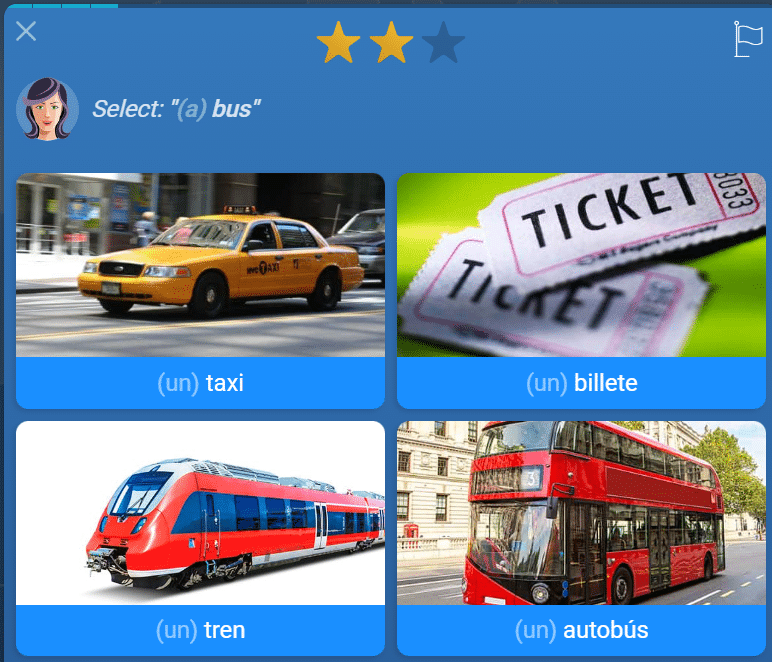
I had a really good overall experience using Mondly’s website and app. For language learners like me, its user-friendly design, thorough course structure, and focus on actual language use make it a fantastic option.
- Wide Language Selection: Mondly offers an extensive range of 41 languages, allowing learners to choose from popular languages as well as less commonly taught ones.
- Interactive Lessons: Mondly’s interactive lessons incorporate multimedia elements, such as audio recordings, visuals, and quizzes, making the learning process engaging and enjoyable.
- Gamification Elements: The platform includes gamification features like quizzes, challenges, and a virtual language learning world, providing motivation and a sense of achievement as learners progress.
- Advanced Speech Recognition: Mondly utilizes advanced speech recognition technology to provide pronunciation practice and feedback, helping learners improve their spoken skills.
- Mobile App with Offline Learning: It offers a mobile app that enables learners to study on the go. The app allows users to download lessons for offline access, providing flexibility and convenience
- Value for Money: Offers affordable subscription plans, including a lifetime option that grants access to all languages. This provides a cost-effective solution for long-term language learning.
- Progress Tracking: Mondly provides progress tracking and analytics, allowing learners to monitor their performance, identify areas of improvement, and track their language learning journey over time.
- Limited Depth of Content: While Mondly covers a wide range of languages, the depth of content may vary across languages, with some languages having more extensive resources than others.
- Reliance on Translation: Although translations can be helpful, some learners may find Mondly’s reliance on translation as a reference for vocabulary and phrases less immersive compared to platforms that focus more on contextual learning.
- Less Emphasis on Cultural Context: Mondly primarily focuses on language learning rather than providing extensive cultural context. Learners seeking in-depth cultural insights alongside language learning may find this aspect lacking.
Rosetta Stone Overview
Millions of people worldwide have used the celebrated language-learning program Rosetta Stone to become fluent in many languages. Rosetta Stone offers a complete platform for acquiring several languages with an emphasis on experiential learning. With its user-friendly design and engaging lectures, students may practice their grammar, vocabulary, and pronunciation using voice recognition and actual-world situations.
Rosetta Stone is a dynamic immersion approach that places an emphasis on contextual comprehension and natural language learning. The program has an organized curriculum and a wide variety of languages to accommodate learners of various skill levels. It is a dependable option for anyone looking for a thorough language learning experience, thanks to its established track record.
My Rosetta Stone Experience
When I first logged into the Rosetta Stone app and website, I was prompted to select my proficiency level as a beginner, intermediate, or pro. I decided to start at the novice level, and my learning objective was “work”. Rosetta Stone promptly set up my microphone and instructed me to say some fundamental Spanish words during the first session. Again, I selected Spanish but you can change the language anytime. Despite being difficult without translations, this strategy made me start practicing speech right away.
Rosetta Stone offers live sessions with native speakers, which is a unique feature that makes learning more engaging and dynamic. The program also provides a huge selection of lessons designed for different situations, like travel, school, job, and shopping. The accessibility of on-demand videos, which assisted me in acquiring a more natural accent and sounding more like a native speaker, was one feature I found very enjoyable.
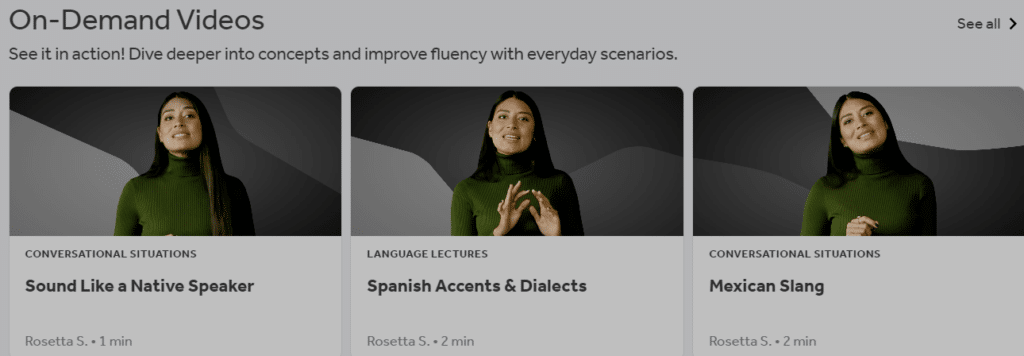
This language learning platform offers a plethora of resources, such as phrasebooks, audio companions, alphabet courses, and language fundamentals. The platform exposes users to a variety of learning modalities, including reading, writing, grammar, vocabulary development, and pronunciation. An all-encompassing method like this one guarantees a well-rounded language-learning experience.
However, I did encounter a minor drawback with the web version of Rosetta Stone, as it tended to load slowly, affecting the overall user experience.
The “Story” part of Rosetta Stone, which lets users read, listen to, or record themselves reading a narrative, is one interesting feature. This interactive method improves fluency and understanding. Additionally, the “Phrasebook” section teaches users useful conversational skills via real-world examples on greetings, introductions, hotel stays, and eating out.
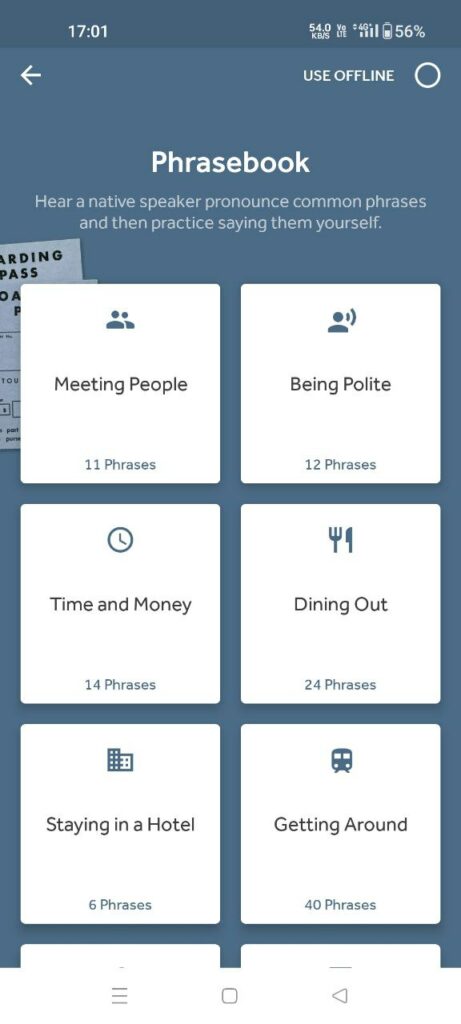
In a nutshell I had a positive experience using the Rosetta Stone app and website. It is a useful tool for language learners because to the focus on pronunciation, the availability of live lessons with native speakers, and the variety of courses. The substantial material and interactive features of the online edition, despite some loading time concerns, provide plenty of opportunity for language skill development. I have a dedicated article on how you can use the Rosetta Stone app the right way.
- Immersive Language Learning: Rosetta Stone emphasizes immersion in the target language, allowing learners to develop their language skills naturally by associating words and phrases with visuals and context.
- Visual-Based Learning: The platform extensively uses visuals and images to aid in vocabulary acquisition, making it particularly effective for visual learners who benefit from visual associations.
- Contextual Learning Approach: Rosetta Stone focuses on teaching language in a context-based manner, helping learners understand and use words and phrases in real-life situations.
- Cultural Insights: Provides cultural insights and context alongside language learning, offering learners a deeper understanding of the language’s cultural aspects.
- Audio Comprehension: With an emphasis on audio-based learning, Rosetta Stone trains learners to comprehend spoken language through immersive listening exercises, improving their listening skills and pronunciation.
- Self-Paced Learning: It allows learners to study at their own pace, giving them the flexibility to progress through lessons based on their individual needs and schedule.
- Simplified User Interface: Rosetta Stone is known for its user-friendly and intuitive interface, making it accessible and easy to navigate for learners of all ages and technical backgrounds.
- Limited Language Selection: While Rosetta Stone offers a variety of languages, the selection is comparatively smaller than some other language learning platforms, with 25 languages available.
- Limited Grammar Instruction: Rosetta Stone focuses primarily on vocabulary acquisition and developing conversational skills, with less emphasis on explicit grammar instruction. Learners who prefer a more structured approach to grammar may find this aspect lacking.
- Price Variation: The pricing for Rosetta Stone can vary depending on language selection and duration, which may result in higher costs for learners interested in specific languages or shorter subscription periods.
Mondly & Rosetta Stone Detailed Comparison
1. User Interface and Experience
Having explored both Mondly and Rosetta Stone, I can provide insights into their user interfaces and experiences. Let’s see how does Rosetta stone compare to Mondly w.r.t UI & UX.
The Mondly user interface is aesthetically pleasing and simple to use. The design of the online and app platforms is comparable, enabling a fluid switch between them. The user interface is simple to use, has a clean menu, and has planned course frameworks.
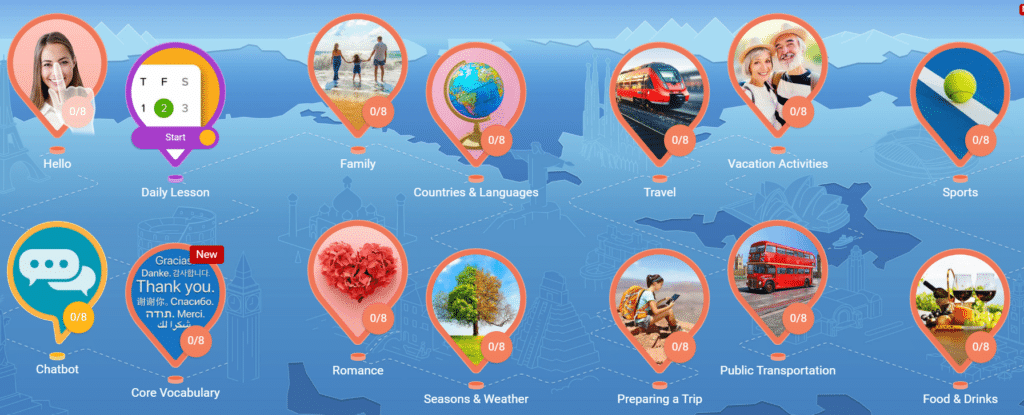
The interactive courses include aesthetically appealing components and intuitive touch controls. Overall, Mondly provides a user-friendly environment that lets users explore with ease and concentrate on their language learning journey.
Rosetta Stone, on the other hand, has a slick, contemporary user interface. The user interfaces on the app and online platforms are straightforward, and both provide a uniform experience. The interface of Rosetta Stone is intended to be simple, putting the emphasis on the course materials. The classes are organized properly, leading students through various language abilities.
Users can practice speaking, listening, reading, and writing in an immersive environment thanks to the interactive activities. The emphasis on a distraction-free experience in Rosetta Stone’s user interface allows students to focus on language learning. However, as I previously mentioned, Rosetta Stone web version is little sluggish & takes time to load the lessons. But once loaded, it works smoothly.
Both systems excel at offering intuitive user interfaces that put convenience of use and navigation first. Rosetta Stone’s basic approach or Mondly’s aesthetically attractive design, both systems provide a pleasant and simple user experience.
2. Language Course Selection
Mondly stands out among platforms in terms of linguistic diversity because to its remarkable offering of 41 languages. Mondly has you covered whether you want to delve into less often taught languages like Finnish or Swahili or study widely spoken languages like English, Spanish, or French. Because there are so many languages to choose from, students can explore many different linguistic avenues and develop their language abilities in many different ways.
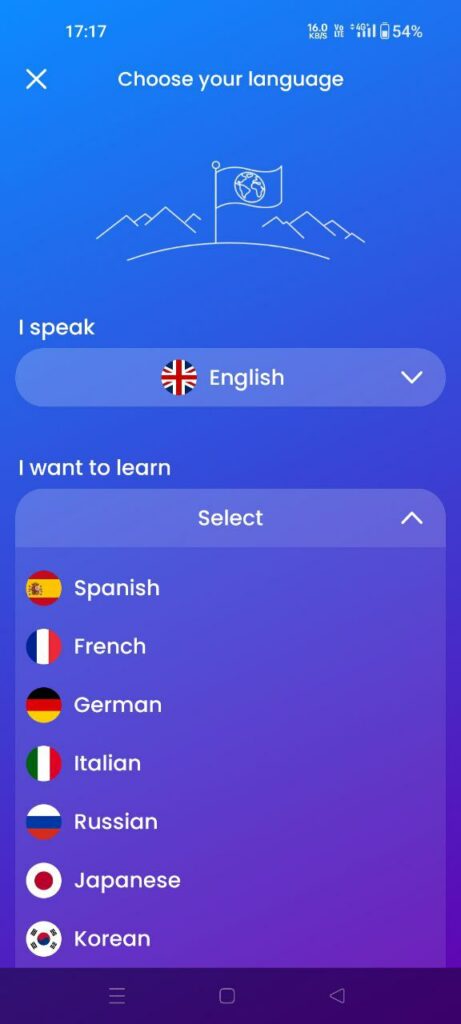
Rosetta Stone provides a good collection of 25 languages. Its range may be a little bit narrower than Mondly’s, but it still includes well-known languages like Spanish, German, and Japanese as well as obscure ones like Irish and Tagalog. The primary goal of Rosetta Stone is to give students a thorough grasp of each language by offering in-depth courses in that language.
Mondly provides lessons that are typically 20 minutes long and range in length from shorter to longer. This time limit offers a well-rounded educational experience and enables users to explore key linguistic concepts in a reasonable session. Lessons on Mondly are organized to be interesting and instructive, keeping students engaged as they advance in their language learning.
While each session with Rosetta Stone lasts around 18 minutes, its average lesson length is a little bit shorter. These brief sessions teach all the necessary language skills while maximizing efficiency and maintaining attention. Lessons from Rosetta Stone are carefully chosen to provide students a thorough introduction to language acquisition in a short amount of time.
Both Mondly and Rosetta Stone provide a wide range of quality language courses that are suitable for students with various language interests. The wide variety of 41 languages offered by Mondly gives students the chance to investigate a variety of linguistic possibilities. With its 25 languages, Rosetta Stone makes sure that students have access to thorough and well-designed courses for each language.
Mondly and Rosetta Stone’s language course selections differ in more ways than language count and average session time.
Mondly distinguishes out for its cutting-edge, engaging, and interactive language training. The vocabulary, grammar, speaking, listening, and writing topics are all extensively covered in each session. To improve practical language use, the classes include conversational activities and examples from real-world situations.
Additionally, it provides personalized training for certain needs like travel, business, or cultural sensitivity. Because of the diversity, students are certain to discover courses that suit their own interests and objectives for learning a language.
On the other hand, Rosetta Stone approaches language learning in a more immersive and contextual manner. Through immersion in authentic environments, their courses place a strong emphasis on language skill development. Without explicit translations, a broad variety of vocabulary and grammatical constructions are presented to learners.
Rosetta Stone places a major emphasis on utilizing voice recognition technologies and audio exercises to establish a solid foundation in pronunciation and listening comprehension. The programs provide a planned path that leads students from beginning to advanced language proficiency.
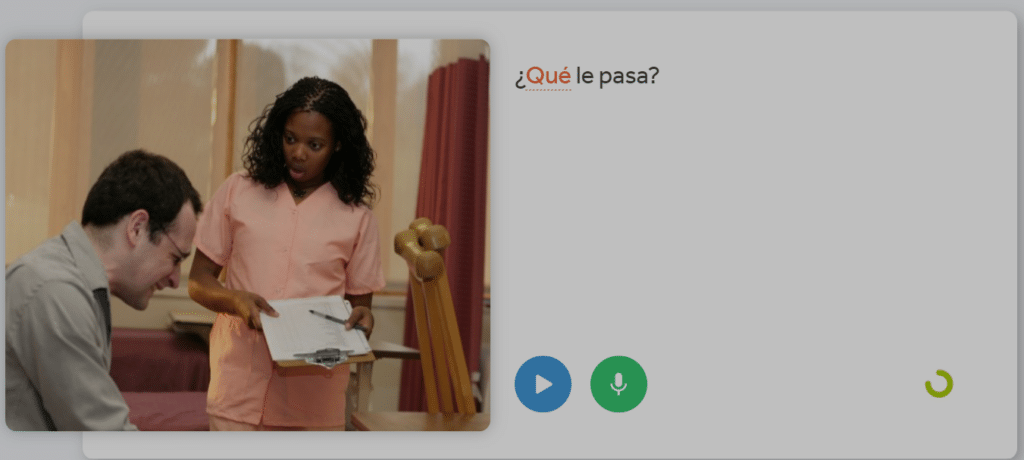
For language learning, both systems include audio and visual components. Rosetta Stone focuses on improving listening skills via immersive audio workouts, while Mondly offers voice recognition technology to help with pronunciation. For the purpose of reinforcing vocabulary and grammatical skills, both platforms also have written tasks and tests.
It’s crucial to take your particular learning preferences and style into account while choosing a language course. Mondly’s wide range of course options may appeal to you if you prefer an engaging and diversified approach to language learning. On the other hand, Rosetta Stone’s strategy could work better for you if you value immersion and contextual learning.
Confused? See how to choose the right language learning app.
3. Learning Methods and Techniques
Mondly and Rosetta Stone use different approaches to mastering a language when it comes to learning strategies and methodologies.
In order to keep learners interested, Mondly combines interactive classes with voice recognition technologies and gamification components. Their lessons are designed to cover various language skills, including vocabulary, grammar, speaking, listening, and writing.
With the use of Mondly’s voice recognition tool, users can enhance their pronunciation since it gives them immediate feedback. To make learning engaging and inspiring, the app also includes gamification components including daily objectives, tests, and challenges.
On the other hand, Rosetta Stone focuses on an immersive learning style and aims to mimic how people naturally pick up their first language. The way they teach immerses students in the target language right away, preventing translation and promoting contextual knowledge.
Also See: Mondly and Memrise comparison
In order to expose users to real language use, Rosetta Stone uses a mix of visual and auditory elements, including pictures, conversations, and native speaker recordings. The focus is on improving speaking and listening abilities, with a focus on correct pronunciation and understanding.
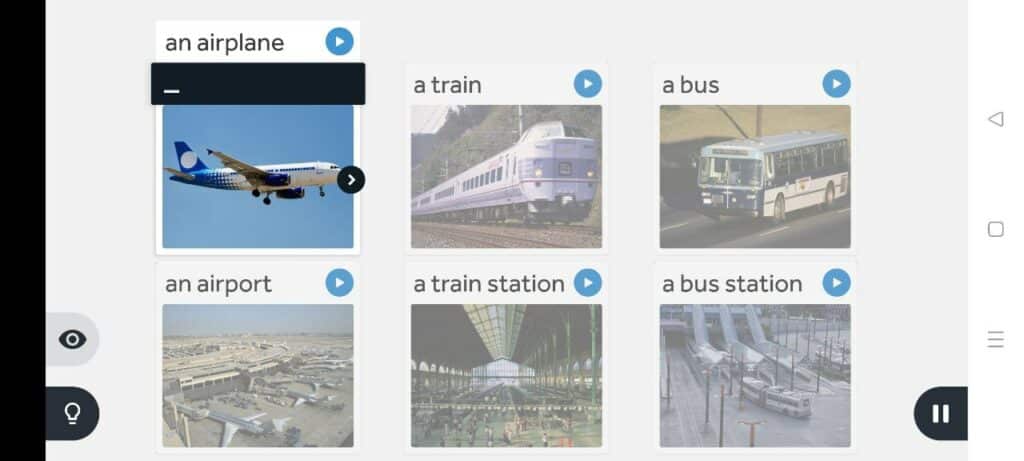
Both frameworks place a strong emphasis on repetition and practice as essential elements of language acquisition. Through daily lectures and interactive activities, Mondly nudges users to practice often. Progress tracking and personalized feedback assist users in identifying areas for development and monitoring their language proficiency over time.
The core of Rosetta Stone’s philosophy is continual exposure to the target language, which enables users to gain fluency by repeatedly being exposed to different language patterns and terminology.
It’s important to take your own learning preferences and style into consideration when comparing Mondly with Rosetta Stone’s teaching strategies. Mondly’s use of technology and gamification might be appealing to you if you choose a more participatory and game-like approach to language learning. On the other side, Rosetta Stone’s focus on context and understanding can be more intriguing if you value immersion and natural language learning.
4. Gamification and Engagement
Let’s compare both the platform w.r.t theie engagement strategies. When it comes to gamification and engagement, Rosetta Stone and Mondly both include components that make learning a language a more pleasurable and participatory experience.
Gamification strategies are used by Mondly across its platform to keep students interested and motivated. Users of the application are rewarded for completing classes, reaching daily objectives, and taking part in challenges with points, badges, and virtual cash.
These interactive elements inspire users to keep on with their language study by giving them a feeling of success. In order to promote healthy competition and community participation, it also includes a scoreboard where users may compete with friends or other students.
On the other hand, Rosetta Stone approaches interaction in a somewhat different way. Despite lacking the same overt gamification components as Mondly, it focuses on creating an engaging and dynamic learning environment.
The courses are intended to be interesting by using real-world examples, interactive activities, and actual audio content. Listening, speaking, and practicing pronunciation are encouraged in Rosetta Stone classes. The objective is to provide a dynamic and engaging learning environment that simulates language usage in everyday situations.
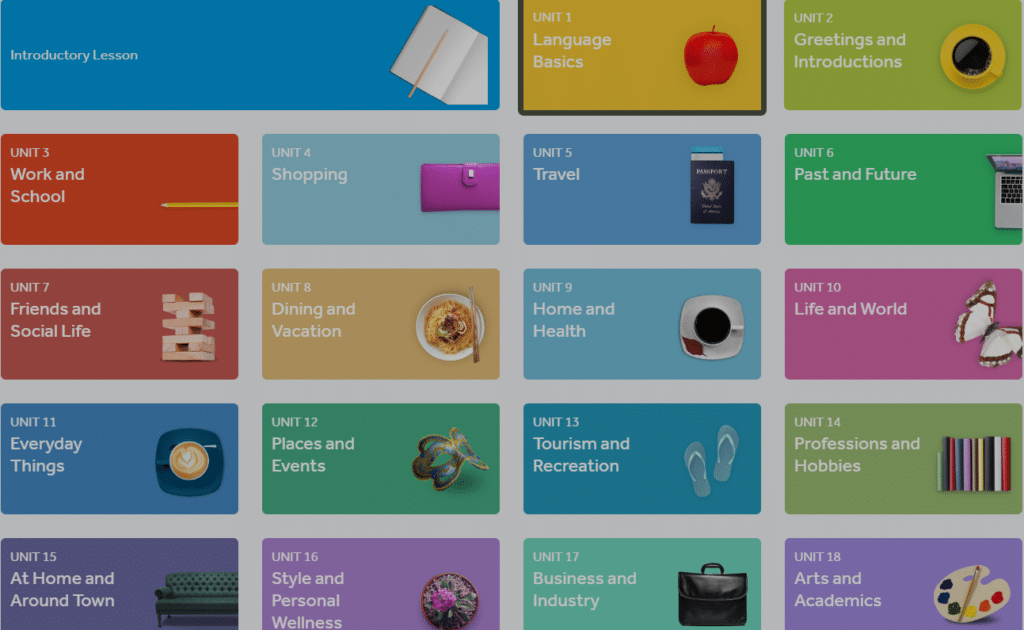
Both platforms make use of several strategies to keep students interested and motivated. Rosetta Stone focuses on immersive and interactive information to hold learners’ attention, whereas Mondly incorporates overt gamification aspects and social rivalry.
Mondly’s method could appeal to you if you like gamified learning with points, badges, and leaderboards. However, Rosetta Stone’s approach could be more appropriate if you desire a more immersive and genuine language experience that places an emphasis on interactive situations.
5. Pronunciation Practice
Both Mondly and Rosetta Stone provide features and resources that help learners in honing their speaking abilities.
Mondly provides users with speech recognition technology, which allows learners to practice their pronunciation and receive instant feedback. Users can identify where they need to improve by comparing their pronunciation to that of native speakers. The voice recognition function of the program is designed to be user-friendly and accurate, offering students helpful direction while they practice their pronunciation.
Rosetta Stone also emphasizes practicing pronunciation a lot. Users of the platform may listen to and imitate real pronunciation thanks to the site’s integration of native speakers’ audio recordings. Through interactive activities, learners are encouraged to speak out and work on their pronunciation. While Mondly offers voice recognition technology, Rosetta Stone focuses on improving students’ listening abilities and assisting them in producing appropriate sounds via imitation.
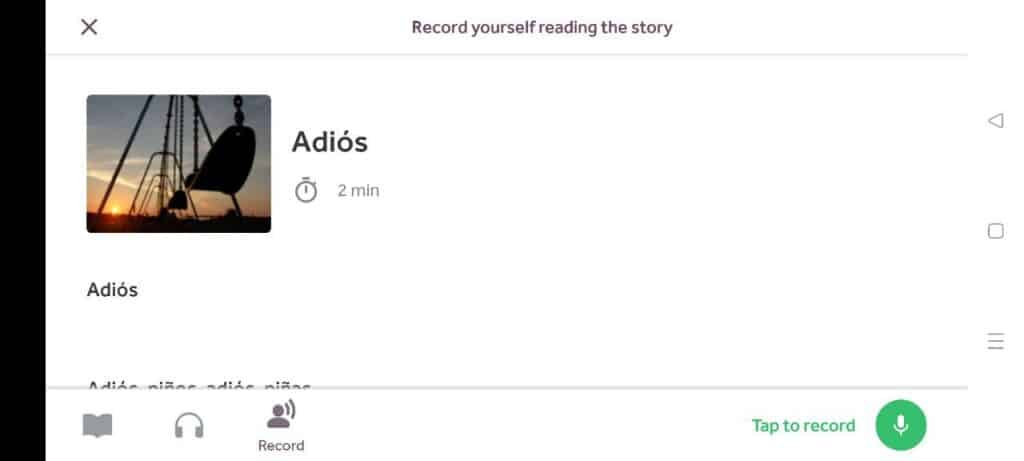
Both platforms offer effective tools for pronunciation practice, albeit with slightly different approaches. With quick feedback from Mondly’s voice recognition tool, students can actively practice on pronouncing words correctly. Rosetta Stone emphasizes listening to and copying native speaker recordings with the goal of improving learners’ pronunciation via immersion and repetition. Is Rosetta stone better than Mondly in this regard? Yes it is.
The method used by Mondly may work better for you if you like the direction and feedback provided by voice recognition software. Rosetta Stone’s concentration on real recordings, however, might be useful if you value immersion and learning via imitation.
6. Progress Tracking and Analytics
Both Mondly and Rosetta Stone provide resources to assist students keep track of their language learning process and their progress over time when it comes to analytics and progress monitoring.
Users can monitor their progress in a variety of ways using Mondly’s extensive progress tracking system. The learning management system gives thorough information on course completion, accuracy, and general competency. Through charts and graphs, learners can track their progress graphically, making it simple to identify their strengths and areas for development.
Mondly also provides tailored suggestions depending on learners’ success, pointing them in the direction of areas that need more focus. Users will remain motivated and committed to their language learning objectives with the support of this progress monitoring function.

Rosetta Stone also includes progress monitoring and statistics to let users know how well-versed they are in a language. Following each lesson, the platform gives users performance evaluation and identifies their strong and weak points.
It also has a “Milestones” function that records learners’ progress and acknowledges their accomplishments along the way. Users can employ this tool to track their growth over time and maintain motivation as they accomplish new goals. If you want to start afresh, just reset all your Rosetta stone progress.
Both of the apps place a strong emphasis on measuring progress and provide users useful information about their linguistic development. Both Mondly and Rosetta Stone allow users to measure their progress and recognize their skills and areas that need more practice by providing statistics, comments, and milestones.
It’s critical to assess your own taste for data visualization and the degree of information you need in your progress tracking when thinking about analytics and progress tracking. Mondly’s in-depth data and tailored suggestions could be more appropriate if you like an aesthetically pleasing and thorough progress monitoring system. On the other side, Rosetta Stone’s “Milestones” function may provide a feeling of success and incentive if you value milestone-based monitoring and feedback.
7. Mobile App Features
When comparing the mobile app features of Mondly and Rosetta Stone, both platforms offer robust and user-friendly applications that enhance the language learning experience on the go.
The mobile app from Mondly offers a number of features that are intended to facilitate language learning anytime, anywhere. The software provides offline access to interactive courses, vocabulary drills, and grammatical tasks. It is great for traveling or studying while on the go since users can download classes and use them without an internet connection.
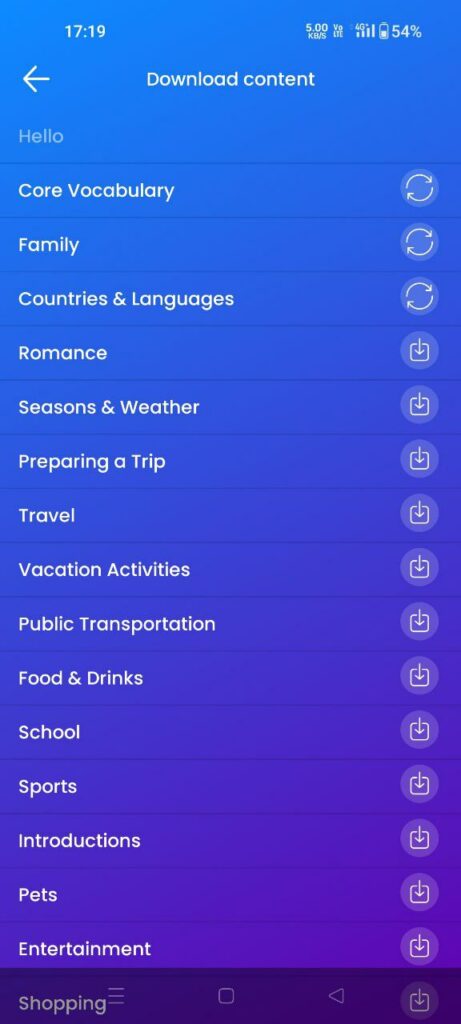
The Mondly app also has voice recognition technology, which enables students to practice pronouncing words and get immediate feedback. To keep users interested and motivated, the app also includes a gamified experience with daily objectives, streaks, and challenges.
The mobile app of Rosetta Stone has a number of features to make studying languages on mobile devices easier. Access to immersive courses, engaging activities, and audio material that can be downloaded for offline study are all made available via the app.
The application of Rosetta Stone is designed to improve speaking and listening abilities, with a particular emphasis on pronunciation. The app encourages users to speak out loud and hone their language abilities while also providing audio recordings of native speakers.
Both applications have intuitive user interfaces that make finding your way around and accessing the instructional resources simple. Additionally, they provide device-to-device progress synchronization, enabling students to switch between mobile and online platforms without losing their work.
It’s important to note that Mondly provides a greater variety of language choices than Rosetta Stone, which can be a determining factor for individuals interested in less often taught languages.
Mondly’s mobile app can be more enticing if you value gamification features, offline learning options, and a wide variety of languages. However, Rosetta Stone’s app can work better for you if immersion is important to you, you want to concentrate on your speaking and listening abilities, and you want a straightforward approach.
8. Speech Recognition Technology
Speech recognition software helps language learners by assisting them in honing their speaking and pronunciation abilities. Let’s compare Rosetta Stone with Mondly’s voice recognition systems.
Mondly uses voice recognition technology in its platform to provide students immediate feedback on how they pronounce words. Users can use the target language in practice sessions and instantly get feedback and ideas for development.
By comparing their pronunciation to that of native speakers, learners may improve their language abilities using Mondly’s voice recognition technology. It is a helpful tool for students to improve their pronunciation and increase self-assurance while speaking.
On the other hand, Rosetta Stone does not largely depend on voice recognition technologies. Instead, it emphasizes imitation and immersion to help with pronunciation. Through listening to audio recordings of native speakers, learners practice imitating their speech patterns and sounds. Rosetta Stone’s methodology pushes students to concentrate on listening and mimicking in order to improve proper pronunciation, even if it does not provide real-time feedback.
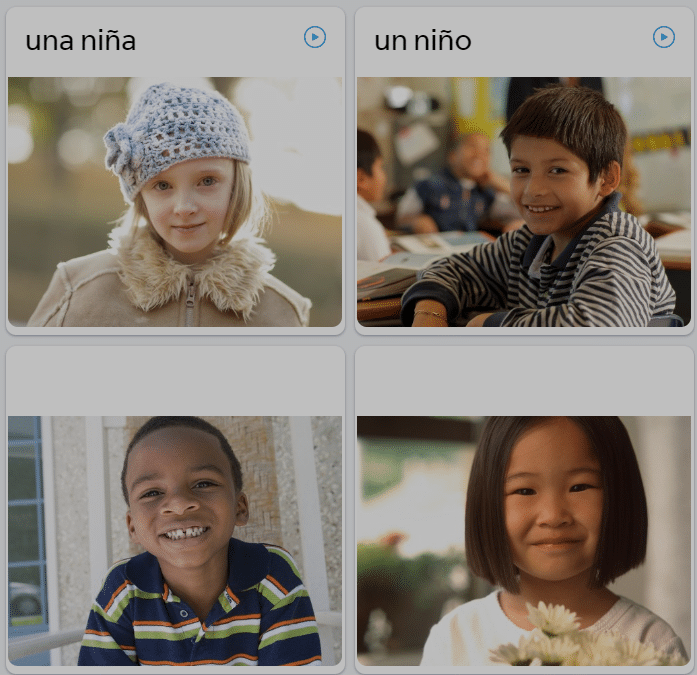
Rosetta Stone and Mondly’s voice recognition systems may be contrasted, and it becomes evident that it prioritizes real-time feedback and pronunciation analysis more. As they go through their language learning process, students may actively work on honing their pronunciation abilities thanks to the immediate feedback offered by Mondly’s voice recognition technology.
On the other hand, Rosetta Stone takes a more immersive and imitation-based approach to pronunciation practice. It uses audio recordings of native speakers to introduce students to real pronunciation and encourages them to copy and replicate those sounds.
Mondly’s voice recognition technology could be more interesting to you if you want real-time feedback and a more involved method of practicing your pronunciation. Conversely, if you prefer a more immersive and imitation-based approach, Rosetta Stone’s emphasis on listening and mimicry might resonate with you.
9. Vocabulary Building Tools
Building a vocabulary is an essential part of learning a language, and Rosetta Stone and Mondly both provide tools for helping students in doing so. Let’s contrast the vocabulary-building resources that each of these sites provides.
Mondly provides a number of vocabulary-building activities to help users improve their language skills. The platform offers engaging courses that contextually introduce new words and phrases so that users may understand their use and meaning.
Flashcards and tests are also included in Mondly to boost language memory. These engaging interactive tasks provide students a chance to practice and revise terminology while having their knowledge put to the test. Additionally, users of Mondly’s mobile app have access to their vocabulary lists and may practice while on the road, which makes it simple to learn vocabulary whenever and wherever.
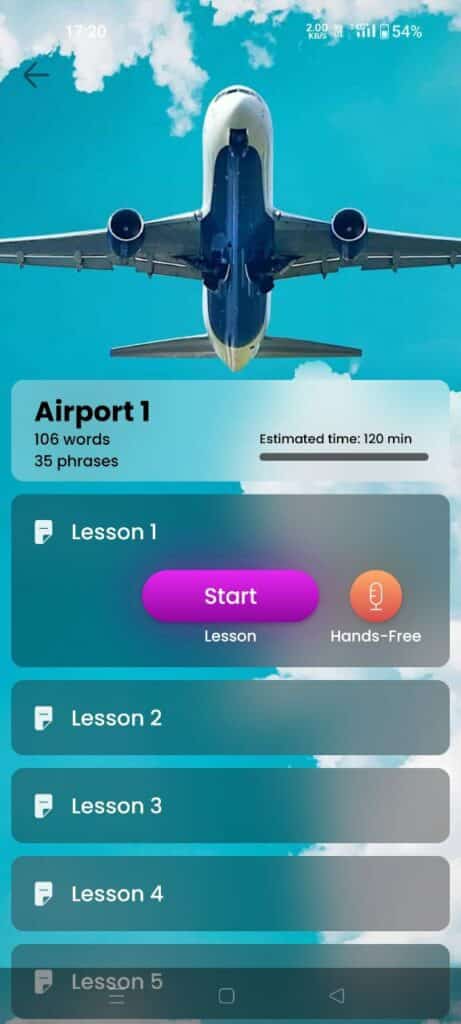
Rosetta Stone places a strong emphasis on vocabulary development as a crucial component of language acquisition. Through interactive lectures and audio recordings, the site exposes new words and expressions. In order to provide a solid basis for vocabulary acquisition, users acquire vocabulary via contextualized examples and repetition.
To improve recall, Rosetta Stone focuses on incorporating words into relevant and useful scenarios. The portal also offers activities and reinforcement exercises to strengthen vocabulary knowledge and promote active recall.
See: Sharing Rosetta Stone with your friends/family
Both language apps include tools for expanding vocabulary that are suited to various learning styles. Rosetta Stone has an emphasis on immersion and contextual comprehension, while Mondly’s flashcards and quizzes provide interactive and gamified methods to reinforce language.
For language learners who want or need to study without an internet connection, offline learning methods are crucial. Let’s examine Rosetta Stone’s and Mondly’s offline learning options.
Mondly provides a convenient offline learning feature for its users. Students can download lessons, vocabulary lists, and other learning resources via the mobile app for offline access.
This implies that you can go on with your language-learning endeavors even when there is no internet access, such as while traveling or in places with spotty connections. The freedom that comes with being able to access classes offline guarantees uninterrupted study.
Similar to this, Rosetta Stone’s smartphone app allows for offline study. Users can get courses and audio material on their devices, enabling them to study anytime they need to without an internet connection. It is appropriate for circumstances when Internet access is unavailable or limited since learners can engage with the language learning content while offline thanks to the downloaded resources.
It’s vital to keep in mind that the availability of offline capabilities may differ based on the subscription plan or platform version you’re using when thinking about offline learning choices. To be sure that the platform will work with your device and the language courses you choose, it is suggested that you examine the specifics and requirements of each one.
11. Personalized Learning and Adaptive Algorithms
Language learning platforms that customise the learning experience for individual learners must include personalised learning and adaptive algorithms. Let’s contrast how Mondly and Rosetta Stone use adaptive algorithms and personalised learning.
Mondly uses personalised learning methodologies. The software uses sophisticated algorithms that adjust based on the learner’s performance, preferences, and progress. Mondly adapts the difficulty level of lectures and activities based on each student’s unique learning preferences.
Students get tailored suggestions based on their areas of strength and need for development. The software also keeps track of users’ progress and offers advice and comments to support their language learning objectives. With Mondly’s personalised approach, students are guaranteed a custom learning experience that meets their individual requirements.
Personalised learning tools are also a part of Rosetta Stone’s platform. Utilising adaptive algorithms, the programme analyses the student’s progress and changes the difficulty and material as necessary. The learner’s skill level is taken into account while designing the lessons and tasks, allowing for progressive advancement.
The adaptive teaching method used by Rosetta Stone ensures that students are constantly pushed without becoming discouraged. The programme also analyses individual progress and offers comments, allowing users to keep tabs on their development over time.
Both platforms seek to tailor the educational experience to the requirements of specific learners and modify the material accordingly. Mondly and Rosetta Stone work to develop a personalised learning route that takes into account various skill levels and learning preferences by using adaptive algorithms.
For students who want a more specialised approach, Mondly’s personalised suggestions and adaptable difficulty levels may be appealing. On the other hand, Rosetta Stone’s adaptive algorithms emphasise steady development and maintaining an ideal degree of difficulty.
11. Translations
Translations are essential for learning a language because they enable speakers to understand and interact in the language they want to learn. Let’s compare Rosetta Stone with Mondly’s translation capabilities.
To improve understanding and communication, Mondly’s platform has translation options. The app offers translations for vocabulary words, phrases, and sentences so that users may comprehend new linguistic material.
The availability of translations in a variety of languages is beneficial for students who may want assistance in their native tongue. This tool improves vocabulary and understanding by helping learners understand new words and phrases.
Rosetta Stone ‘approaches translations in a different way. Without depending excessively on translations, the platform places an emphasis on interactive learning. The “no translation” approach used by Rosetta Stone aims to teach languages via context and immersion.
Instead of depending on translations, the emphasis is on developing language abilities via the direct association of words and phrases with visuals. Through this method, students are encouraged to think in the target language and get a natural knowledge of its grammar and use.
The translation tools in Mondly may be useful if you like having access to translations as a resource or help. It can help you comprehend and clarify concepts, particularly when you come across unfamiliar words or difficult sentences. Rosetta Stone’s method can be preferable, nevertheless, if you want a more immersive and contextual learning experience that promotes thinking and comprehension in the target language without depending on translations.
Translations are important for early comprehension, but language learning should finally lead to understanding and reasoning in the target language. Both platforms strive to provide a whole language learning experience, with Rosetta Stone relying less on translations and Mondly using them as a supplementary tool.
So, Mondly or Rosetta stone, which is better if you are there for translations? I would go with Mondly.
12. Customer Support
Any language learning platform should include customer support. It promises that consumers will get fast help and direction when they need it.
Mondly provides customer support through various channels, including email and online contact forms. Users can reach the their support staff with any questions, difficulties, or technical problems. To provide a positive user experience, the platform works to promptly respond to user inquiries and resolve them. In addition, Mondly provides lessons and a thorough FAQ section on their website to answer frequently asked problems and give resources for self-help.
Additionally, Rosetta Stone provides customer service through a variety of methods, such as phone and email. Users can communicate with the support staff directly to ask questions or get help with problems they may be having.
In order to ensure that users have a positive learning experience, Rosetta Stone strives to provide attentive and helpful customer service. The portal also offers a knowledge base and community forums where users can communicate with other students and get answers to frequently asked issues.
13. Pricing
| Language Learning Platform | Plan | Duration | Price | Number of Languages |
|---|---|---|---|---|
| Mondly | 1 month | 1 month | $9.99 | 1 |
| 12 Months | 12 months | $47.99 | 1 | |
| Lifetime | Lifetime | $89.99 | 41 | |
| Rosetta Stone | 3 months | 3 months | $11.99/mo | 1 |
| 12 Months | 12 months | $7.99/mo | 1 | |
| Lifetime | Lifetime | $179/one time | 25 |
When considering the pricing plans, it’s important to assess the return on investment (ROI) and affordability. Users can select the plan that best meets their requirements from a variety of Mondly plans with varying lengths.
For a one-time charge of $89.99, Mondly’s lifetime subscription stands out since it offers access to all 41 languages that the site offers. For students who are interested in learning many languages or who want lifelong access to language learning tools, this might be seen as a worthwhile long-term investment.
How much does Rosetta stone app cost? Rosetta Stone offers competitive pricing, particularly in its 12-month plan, which is priced at $7.99 and provides access to one language. For students who are committed to learning a single language for a longer period of time, this option could prove more cost-effective. Also, you get the full access to premium content with their 3-day free trial. (See how to get Rosetta Stone for free).
Rosetta Stone and Mondly both provide a variety of price plans to suit various requirements and spending limits. When considering the cost, it’s critical to take the platform’s significance, the number of languages you wish to study, and the length of your language-learning journey into mind.
What are the key differences between Mondly & Rosetta Stone?
- Language Options: Rosetta Stone only offers 25 languages, but Mondly offers a greater variety of 41 languages. This might be a deciding factor if you have a certain language in mind that neither platform supports.
- Learning Techniques: Mondly uses gamification, augmented reality, and interactive teaching to keep students interested. Rosetta Stone emphasises visual and aural connection without a lot of dependence on translation, focusing on immersion and context-based learning.
- Pricing & Subscription choices: Mondly provides reasonable monthly, annual, and lifetime subscription choices, including a lifetime plan that provides access to all languages. It has subscription options as well, however the cost depends on the number of languages and length of use.
- Mondly’s user interface is simple to use and aesthetically attractive, making it simple to access features like daily courses and progress monitoring. The user interface of Rosetta Stone is renowned for being easy and engaging in how it presents courses.
- Gamification and Engagement: To keep students motivated and interested, Mondly uses gamification components including quizzes, challenges, and incentives. Rosetta Stone focuses on creating an immersive environment through visuals and audio, encouraging learners to think and respond in the target language.
How Mondly is Better (& for whom)?
Mondly’s interactive courses and gamification components are ideal for language learners who want a wide choice of possibilities. Here’s a breakdown of who Mondly is best for and what it offers:
- Learners of Languages: Mondly serves language students at all proficiency levels, from absolute beginners to experts. It is a great option for anyone who want to learn many languages at once or a broad variety of languages, since it provides a vast range of 41 languages.
- Interactive Learning: It uses multimedia components, including audio recordings, images, and quizzes, in its interactive classes. Learners who prefer interactive and immersive experiences when learning a new language may find this technique to be appealing.
- Gamification Enthusiasts: It incorporates games, challenges, and a virtual language learning environment into their platform. This gamified method makes learning a new language enjoyable and encourages users to go through the classes.
- Pronunciation Improvement: The app uses cutting-edge voice recognition technology to provide practise and feedback on pronunciation. This function could benefit learners who want to hone their speaking abilities and get real-time pronunciation assistance.
- Mobile Learners: Mondly offers a mobile app that allows users to learn on the go. It’s the perfect alternative for those who appreciate flexible learning and want to study whenever and wherever since they can download courses for offline access.
- Value-Oriented Learners: It offers reasonably priced membership packages, such as a lifetime option that gives access to all languages. As a result, it is an affordable option for students looking for long-term language learning tools without ongoing membership costs.
How Rosetta Stone is Better (& for whom)?
For those who like an immersive and context-based method of language learning, Rosetta Stone is the finest option.
- Immersion Enthusiasts: Rosetta Stone focuses on creating an immersive language learning environment. It encourages speakers of the target language to react and think in that language rather than heavily relying on translations. This method is appropriate for those who wish to fully learn the language and want a natural language acquisition process.
- Visual Learners: Rosetta Stone helps visual learners understand and recall knowledge by associating words and phrases with their meanings. It is a fantastic option for language learners who like visual assistance because of the focus on visual context.
- Self-Motivated Learners: It provides a self-paced learning experience, allowing individuals to study at their own pace without strict time constraints. This is ideal for independent learners who are self-driven in their pursuit of language proficiency.
- Travelers and Cultural Enthusiasts: It places importance on cultural aspects and understanding the language in its cultural context. It provides understanding of the traditions, culture, and conventions related to the language being learnt. This feature might be very useful for those who want to travel or who are really interested in other cultures.
- Audio Comprehension: The platform emphasizes audio-based learning, training learners to comprehend spoken language through immersive listening exercises. This emphasis on auditory abilities is advantageous for those who desire to enhance their pronunciation and listening comprehension.
- Simplified User Interface: Rosetta Stone is known for its simple and intuitive user interface, which makes it accessible and easy to use for people of all ages and technical backgrounds.
Mondly User Feedbacks
Mondly is highly regarded by users since it offers a fantastic platform for encouraging actual fluency in language acquisition. Mondly’s three levels—beginners, intermediate, and advanced—provide a complete learning experience for all users. The app’s range of exercises and feedback systems improve the educational process and make for a dynamic and interesting trip.
Users are grateful for the most recent enhancements, especially the sophisticated and engaging hands-free function that broadens the scope of the educational process. Mondly stands out from the competition since it offers Finnish, a language that was previously difficult to get in other language learning applications. Many users have found it beneficial to use Mondly alongside other apps like Duolingo, as each app offers a unique approach and helpful learning resources.
The app’s limited and unobtrusive advertising is one feature that consumers really like. The ads present are solely focused on upgrading the app itself, ensuring a seamless and uninterrupted learning experience. Additionally, the efficacy and enjoyment factor of Mondly’s learning strategy, which includes memory matching with visuals, spelling, and pronunciation, are highly commended. The app’s ability to choose texts in several languages improves the immersion feature and allows for multilingual practise for a more thorough language learning journey.
Overall, people who have been using the app for a while give Mondly their highest recommendation. It is a top pick for language learners looking for an entertaining and effective language learning experience due to its combination of interactive learning techniques, interesting features, numerous language selections, and low advertising.
Rosetta Stone User Feedbacks
Users highly applaud Rosetta Stone’s study alternatives for their variety, which let students customise their study time depending on their language proficiency. Rosetta Stone pushes learners without “dumbing down” the information, keeping them interested and motivated. The curriculum demands that students follow along while continually reviewing and solidifying prior information.
Rosetta Stone’s intuitive UI makes it simple to use and navigate. The classes provide the impression that students are being guided by a real instructor who is checking their comprehension to make sure the knowledge is retained. Lessons are intelligently crafted to challenge students’ knowledge in a variety of ways without becoming boring. Carefully planned levels of difficulty challenge learners’ mental processes and promote lifelong learning. The degree of intellectual difficulty and pleasurable involvement is just ideal for the programme.
Users laud the progressive introduction of fundamental verbs, important nouns, pronouns, and single and plural forms in the classes. They anticipate with interest how the modules will present increasingly challenging sentence constructions and tenses as they go. Although there may sometimes be differences in word pronunciation, users are aware that these occurrences are uncommon and have little influence on their overall experience.
Users generally have favourable things to say about Rosetta Stone and like its user-friendly design, entertaining and difficult study alternatives, and progressive introduction of language topics. The programme deserves praise for its capacity to foster intellectual development while preserving a fun learning atmosphere.
Mondly vs Rosetta Stone- Summary
Mondly
Total Languages: 41
Starts from: $9.99
Progress tracking
30 days money back guarantee
What did We like?
With its large language selection, interactive lessons, and gamification features, Mondly is a dynamic and entertaining language learning software that stands out. With 41 languages available, learners have the freedom to study the languages they are most interested in. Advanced voice recognition technology, AR/VR feature and the immersive training make it easier to practise pronouncing words and improve speaking abilities. You can learn whenever and wherever you choose with the ease of the offline learning features in the mobile app from Mondly. Mondly’s inexpensive cost, vast features, and focus on user experience make it a top choice for language learners looking for an engaging and value-oriented learning experience.
- Wide Language Selection
- Interactive Lessons
- Gamification Elements
- Advanced Speech Recognition
- Mobile App with Offline Learning
- Value for Money
- Progress Tracking
- Limited Depth of Content
- Reliance on Translation
- Less Emphasis on Cultural Context
Rosetta Stone
Total Languages: 25
Starts from: $11.99
Live classes
30 days money back guarantee
What did We like?
Rosetta Stone is the best option if you’re looking for an immersive language learning experience that emphasises context-based learning and visual correlations. Because of the focus on immersion, you’ll automatically pick up language skills and acquire cultural awareness as you go. The audio-based activities enhance listening comprehension and pronunciation while the visual-based learning strategy assists with vocabulary development. Rosetta Stone provides a successful and entertaining language learning experience with a self-paced learning environment and a user-friendly interface. Utilise Rosetta Stone to explore a new tongue and realise your linguistic potential.
- Immersive Language Learning
- Visual-Based Learning
- Contextual Learning Approach
- Cultural Insights
- Audio Comprehension
- Self-Paced Learning
- Simplified User Interface
- Limited Language Selection
- Limited Grammar Instruction
- Price Variation
Yes, Rosetta Stone provides an effective approach to language learning through its immersive and context-based methodology. By focusing on visual and auditory association, it helps learners develop language skills naturally.
Rosetta Stone and Mondly are both popular language learning platforms, but they differ in their approaches. Rosetta Stone emphasizes immersion and visual-based learning, while Mondly offers interactive lessons with gamification elements. The choice between the two depends on personal preferences and learning styles.
Yes, both Mondly and Rosetta Stone offer mobile apps for convenient language learning on the go. You can download the apps on your iOS or Android devices and access lessons, exercises, and progress tracking features.
Yes, both platforms allow you to learn multiple languages. Mondly offers a wide range of 41 languages, while Rosetta Stone provides 25 languages. You can choose the languages you want to learn and access the respective lessons and resources.
Yes, Rosetta Stone offer free trial period for 3 days, allowing users to explore the platform and experience some of the features before committing to a subscription. This trial period varies in duration, and it’s a great way to determine if the platform aligns with your language learning goals. If you didn’t like, you are free to cancel your subscription anytime.

Meet Bill, a French language teacher and blogger who specializes in testing various language learning apps. He has been teaching French for nearly 4 decades and holds a Bachelor’s degree from Manhattanville College. With a passion for technology and how it can enhance language learning, Bill has spent years testing and reviewing different language learning platforms. His blog provides valuable insights into the pros and cons of each app, as well as tips for language learners of all levels.
